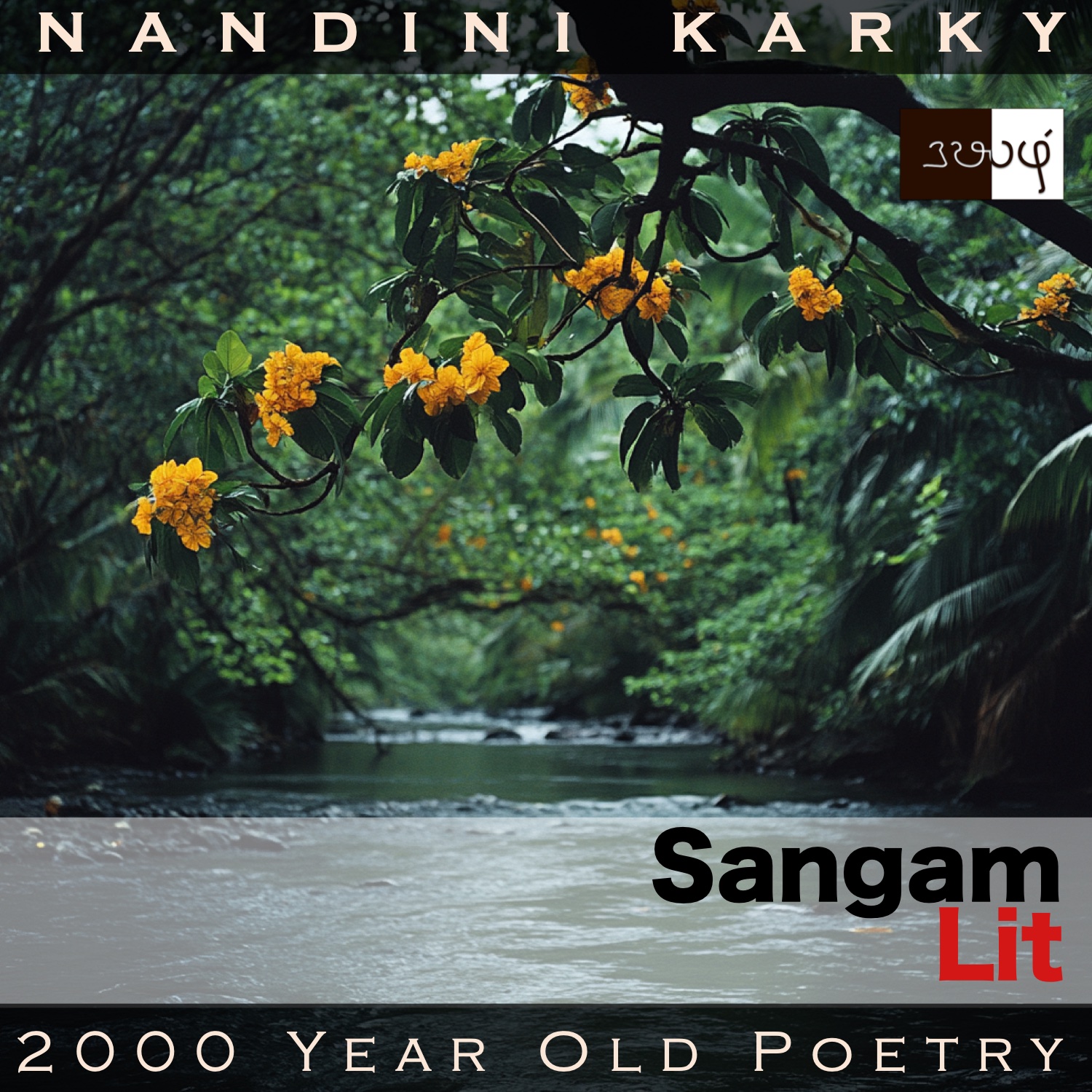Podcast: Play in new window | Download
Subscribe: Apple Podcasts | Spotify | Amazon Music | Android | iHeartRadio | TuneIn | RSS | More
In this episode, we listen to a lady’s lament and a confidante’s consolation, as portrayed in Sangam Literary work, Kalithogai 28, penned by the Chera King Paalai Paadiya Perunkadunko. The verse is situated in the ‘Paalai’ or ‘Drylands landscape’ and narrates the seasonal changes in spring.

‘பாடல் சால் சிறப்பின் சினையவும், சுனையவும்
நாடினர் கொயல் வேண்டா, நயந்து தாம் கொடுப்ப போல்,
தோடு அவிழ் கமழ் கண்ணி தையுபு புனைவார்கண்
தோடுறத் தாழ்ந்து, துறை துறை கவின் பெற,
செய்யவள் அணி அகலத்து ஆரமொடு அணி கொள்பு,
தொய்யகம் தாழ்ந்த கதுப்புப் போல் துவர் மணல்
வையை வார் அவிர் அறல், இடை போழும் பொழுதினான்
விரிந்து ஆனா மலராயின், விளித்து ஆலும் குயிலாயின்,
பிரிந்து உள்ளார் அவராயின், பேதுறூஉம் பொழுதாயின்,
அரும் படர் அவல நோய் ஆற்றுவள் என்னாது
வருந்த, நோய் மிகுமாயின் வணங்கிறை! அளி என்னோ?
புதலவை மலராயின், பொங்கரின வண்டாயின்,
அயலதை அலராயின், அகன்று உள்ளார் அவராயின்,
மதலை இல் நெஞ்சொடு மதனிலள் என்னாது
நுதல் ஊரும் பசப்பாயின் நுணங்கிறை! அளி என்னோ?
தோயின அறலாயின், சுரும்பு ஆர்க்கும் சினையாயின்,
மாவின தளிராயின், மறந்து உள்ளார் அவராயின்,
பூ எழில் இழந்த கண் புலம்பு கொண்டு அமையாது
பாயல் நோய் மிகுமாயின் பைந்தொடி! அளி என்னோ?’
என ஆங்கு,
ஆயிழாய்! ஆங்கனம் உரையாதி; சேயார்க்கு
நாம் தூது மொழிந்தனம் விடல் வேண்டா; நம்மினும்
தாம் பிரிந்து உறைதல் ஆற்றலர்,
பரிந்து எவன் செய்தி வருகுவர் விரைந்தே.
It’s the same duo of maidens in conversation here! The words can be translated as follows:
“Flowers, worthy of being sung in a song, are endowed with affection by the low hanging branches to those who adorn themselves with fragrant flower garlands containing blooming petals, giving no reason for them to search for these flowers in branches and springs. These branches adorn the river shores with such allure. Akin to how a necklace beautifies the wide chest of the goddess, flows the river Vaigai, amidst the salty red sands, akin to tresses that have descended out of their ‘thoyyagam’ clasp. Such is the season of spring!
The flowers have bloomed, the cuckoos have sent out their calls, and yet he, who is parted from me, thinks not that in this confusing time, she will suffer because of the terrible affliction and that disease will soar in her, O maiden with curving forearms! What can his grace do?
The bushes have flowered, bees have started buzzing in the groves, and slander has spread among the neighbours, and yet, if he who lives apart from me, thinks not that her heart will lack the strength and support, and that pallor would spread on her forehead, O maiden with swaying arms! What can his grace do?
The sands have become soaked, the branches have started buzzing with bees, and the mango tree has sprouted new leaves, and yet, if he has forgotten me, making my flower-like eyes lose their beauty and suffer in loneliness, as this disease brims over, O maiden wearing new bangles! What can his grace do?
Do not say all this, O maiden wearing well-etched ornaments! Let’s not send a messenger to the one who lives far away; Even more than you, he cannot bear to be apart. What’s the use of worrying? He will be back soon!”
Let’s explore the details. The verse is situated in the context of the man’s parting after marriage and speaks in the voice of the lady initially, followed by the concluding words of the confidante. The lady starts by talking about the exquisite branches of flowering trees that hang low over the Vaigai river, offering their blooms to those who want to make flower garlands, without any need for searching in faraway trees or springs. And the river too flows like a necklace on the chest of a goddess, a creative way of illustrating the geographic concept of ‘river meandering’. Once again, the river sands are equated to the tresses of women that have escaped a clasp mentioned as ‘thoyyagam’, possibly the rubber bands or hair pins of the Sangam era!
The lady has mentioned these elements of land to inform how the season of spring has arrived, and she continues by talking about all the changes such as the blooming of flowers, buzzing of bees, singing by cuckoos, slander from neighbours, soaking of river sands, sprouting of mango trees, and so on, mentioning the exuberant expressions of nature as this season enters the fold. She adds yet the man does not think about how love affliction, pallor and the disease of loneliness would spread in her, and he remains far away. So, she asks the same question wondering what good can his grace do later when he returns. Hearing this, the confidante asks her not to speak so, and declares the man is someone who cannot bear to be apart from the lady and advises that there’s no use in worrying, concluding that he’ll be back soon. The confidante’s good sense echoes in these words and instead of running out of patience for this lamenting lady, who seems so helpless without her man, we can instead admire the persistent portrayal of sense and sensibility in the psyche of the confidante!




Share your thoughts...